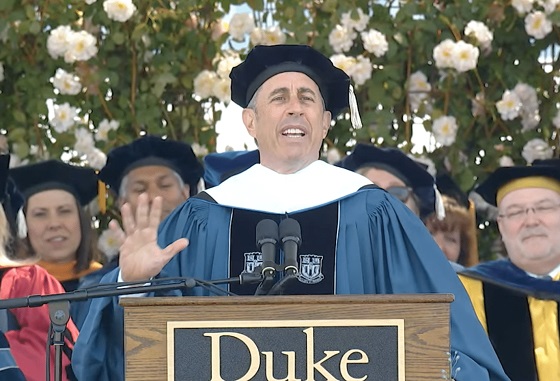Bruce Dowbiggin
Woe Is Me: The Unshakeable Pessimism Of The Progressive Mind

The recent Grammy Tribute to Paul Simon features a haunting performance of An American Tune by the songwriter along with singer/ banjo player Rhiannon Giddens. The pessimistic lyrics clearly resonated with a Hollywood audience that looked like a Democratic Party fundraiser.
“I don’t know a soul who’s not been battered
I don’t have a friend who feels at ease
I don’t know a dream that’s not been shattered
Oh, but it’s all right, it’s all right
For we’ve lived so well so long
Still, when I think of the road we’re traveling on
I can’t help it, I wonder what’s gone wrong.”
Even as it was laying off dozens of staffers, the L.A. Times rushed to canonize the song’s performance. While Simon’s world-weary tone echoes the current zeitgeist in Canada and the West, it’s notable that the song was released in 1973. The world Simon described was a far cry from today’s apocalyptic 1984 when men purportedly can have babies, forest fires are caused by CO2 and the climate is reported to collapse within five years.
The world Simon described in An American Tune was post-Viet Nam, post 1960s rebellion and during Watergate. To him it must have seemed catastrophic to an American liberal culture he knew when the album Rhyming’ Simon was released in 1973. To those of us today, seen in retrospect, the “dreams shattered” are almost nostalgic.

But the real tell in the song’s lyrics is that world-weary ennui has long been the fallback position of the American/Canadian Left. When you hear the apocalyptic Malthusian tones from its current junta— Al Gore, AOC, Greta Thunberg, the Hollywood mafia, Blackrock— demanding that society surrender so many of its norms to satisfy their virtue, you are seeing a precedent dating back to the 70s and earlier.
Put simply, the secularists of the Left, lacking spiritual inspiration, have always found it hard to embrace the exuberance, the positivity of the “American Tune” that Simon hints at in the song.
“For we come on the ship they call the Mayflower
We come on the ship that sailed the moon
We come in the age’s most uncertain hour
And sing an American tune.”
When the song was written, the fashionable people of the Left were in the process of excoriating Ronald Reagan’s “shining city on the hill” vision of America. There was a sense of threat from Reagan’s embrace of capitalism and sentimental patriotism. They saw Reagan’s talk of strategic defence systems and waving the flag as an impediment to their Jimmy Carter love.

In the End Of The Innocence, Don Henley lamented the “Tired old man that we elected king”. He described Reagan turning “plowshares into swords”. Simply Red mocked Nancy Reagan with, “Did the earth move for you, Nancy?” Bruce Springsteen’s bitter 1984 opus “Born In The USA”, a sad ode to Viet Nam indifference, summed up the alienation during the Reagan age.
“Born down in a dead man’s town
The first kick I took was when I hit the ground
You end up like a dog that’s been beat too much
‘Til you spend half your life just coverin’ up.”
Many others, like Simon and Springsteen, would see something lost and nothing gained despite Reagan ending the nuclear threat of the Cold War. In short, this is what the Left does about everything that frightens them. Don the sack cloth and look for people to blame. Or, in Reagan’s case, try to assassinate him.

Saturday Night Live consistently mocked Reagan as the doddering old man that Joe Biden has morphed into. But the 70s radicals hadn’t captured the culture industry as they have today, when they can shove their bizarre values down the throats of a bewildered population. And their hour passed.
The Born In The USA children were thick on the floor in the Grammy Show, clearly supporting the fashionable agenda of this day. Grey-haired, stooped, botoxed, Invisaligned teeth— they knew all the plaintive words to Simon’s songs played that night by Stevie Wonder, Garth Brooks, Sting and so many others. (They were a generation that also knew the lyric and the meaning of, “Something is happening here, and you don’t know what it is, do you Mr. Jones?” )
Now, 50 years later, they have the whip hand. They should be no need for lamentations after railroading an elected GOP president from office through nefarious operations with the FBI, CIA and DOJ. They have installed a Pride Month where there is a single Remembrance Day or Veterans Day. They have cowed the corporate world into making the interests of five percent of the population into the overarching narratives of the day.
And yet they still see themselves as put-upon and under threat of right-wing extremism. The spectre of The Handmaid’s Tale spooks young women of extreme privilege. The trans movement makes progessives see themselves— or their kids— in the wrong body. They live in fear of cow farts and gas stoves. The fading American dream is now just the hook to a popular Paul Simon song.
“But it’s all right, it’s all right, all right,
You can’t be forever blessed
Still, tomorrow’s going to be another working day
And I’m trying to get some rest
The baleful blubbering is exhausting. It’s cynical. It’s predictable. Remember that next time your friendly media shill tells you that the current forest fire is a symptom of climate change. We’ve been here before. Many times.
Sign up today for Not The Public Broadcaster newsletters. Hot takes/ cool slants on sports and current affairs. Have the latest columns delivered to your mail box. Tell your friends to join, too. Always provocative, always independent. https://share.hsforms.com/16edbhhC3TTKg6jAaRyP7rActsj5
Bruce Dowbiggin @dowbboy is the editor of Not The Public Broadcaster A two-time winner of the Gemini Award as Canada’s top television sports broadcaster, he’s a regular contributor to Sirius XM Canada Talks Ch. 167. Inexact Science: The Six Most Compelling Draft Years In NHL History, his new book with his son Evan, was voted the seventh-best professional hockey book of all time by bookauthority.org . His 2004 book Money Players was voted sixth best on the same list, and is available via http://brucedowbigginbooks.ca/book-personalaccount.aspx
Bruce Dowbiggin
Jerry Came to See The Babies. And They Walked Out On Him

Cometh the hour, cometh the comedian. Or, you can learn a lot about a demographic by what makes them laugh.
The legacy/ lunacy media schvitzed itself over a few furious sociology majors and look-at-me drama queens walking out on Jerry Seinfeld’s commencement address at Duke University last weekend. But the significance of his admission that he was 70 was probably far more newsworthy to those now in retirement, binge-watching his eponymous TV series on one of those down-the-dial channels.
If we had a dollar for every Boomer who said, “Seinfeld is 70?” while watching the address we’d be Warren-Buffett-rich this morning. He doesn’t look like any 70 year olds we know. Fifty? Maybe. But listening to his familiar delivery, the mocking on his honorary degree costume, it was easy to believe that we, too, are much younger than our blood-thinner prescriptions say.
It also pointed out the evolution of Boomers’ comedic tastes. When they came of age in the late 1960s/ early 1970s Woody Allen best profiled as his generation’s comedic muse. With a dozen classic movies ranging from What’s New Pussycat (1965) through Play It Again Sam (1972) to Annie Hall (1977) Allen’s self-deprecating nebbish captured the romantic/ridiculous self-image of Boomers with “Some drink deeply from the river of knowledge. Others only gargle”.

The neurotic, insecure Allen then decided to become Ingmar Bergman, and Boomers— now assembling jobs, children and first spouses— moved on. But for that 12-year span the bedraggled standup comedian was the go-to with lines like “Just because you’re paranoid doesn’t mean they aren’t out to get you” and “The only love that lasts is unrequited love.”
Woody’s pointed contemporary political references in those years were few (conflating “D’you” for “Jew” with Tony Roberts in Manhattan) and self-deflating (see Annie Hall). His most prominent political jabs were framed in absurdist material like Love And Death and Bananas. Culturally he was merciless but affectionate about his Brooklyn upbringing. In short his were perfect date movies for Boomers seeking love to advertise their pretensions.
Flash forward from Woody to Seinfeld (created with Larry David) which was anti-romantic in the extreme. The characters were sociopaths. The situations often cringeworthy. The 24-minute formula harkened back to Lucy and the Honeymooners. And while schlock like Friends trod the same ground it was Seinfeld that somehow captured the Boomer zeitgeist.
Why? Boomers going through middle age were too disillusioned with how life was turning out to romanticize anymore. The self-obsessed characters were people they knew from work, school and dealing with government. Smirking Bill Clinton was the face of an era. “When we did my show in the 90s, it was so easy to make fun of things. It was so easy,” Seinfeld told Amy Schumer.
Significantly, Seinfeld the Show was cultural. Or quasi-cultural. It was never about politics per se. It was about the people who thwart you in life. Whose vanity ruins your plans from school days. Who go 50 mph in the left lane. “When is Jerry going to see the baby?” It rarely challenged its fans on an emotional level. It was mostly about navigating madness.
And often about the most mundane elements of life. The address on the weekend contained The Seinfeld Doctrine of Lowered Expectations. “It’s easy to fall in love with people. I suggest falling in love with anything and everything, every chance you get. Fall in love with your coffee, your sneakers, your blue zone parking space. I’ve had a lot of fun in life falling in love with stupid, meaningless physical objects.
“The object I love the most is the clear-barrel Bic pen — $1.29 for a box of 10. I can fall in love with a car turn signal switch that has a nice feel to it, a pizza crust that collapses with just the right amount of pressure. I have truly spent my life focusing on the smallest things imaginable, completely oblivious to all the big issues of living.”
Reaching across the generations Seinfeld delivered Dad jokes and bromides to kids who education probably cost $100 K a year. “I think it is also wonderful that you care so much about not hurting other people’s feelings in the million and one ways we all do that,” he said. Then he explained why that might be a fruitless pursuit. Not in Curb Your Enthusiasm darkness. But sobering.
That’s why it was in character for him to let the furious demonstrators depart at Duke without comment. So was appearing at Duke, the Ivy League of Tobacco Road, founded by the people who made jillions selling nicotine. And why he let them garb him like Thomas Cromwell in the absurd 16th century cape and hat so he could score few laughs.

Because laughter is his means of dealing with jerks like the outbound Hamas crowd. “What I need to tell you as a comedian: Do not lose your sense of humour. You can have no idea at this point in your life how much you are going to need it to get through. Not enough of life makes sense for you to be able to survive it without humour.”
Yes, He has been vocal lately about the effect of political correctness ruining TV comedy. Drawing flak from former friends and fans who are in the Biden re-education camps at the moment. But his annoyance at ruining an art form far outweighed any complaints about Covid and Ukraine.
As opposed to the nihilism of his former partner David, his insouciance and comic patter represent an antidote for where most of his original fans are at the moment. Woody Allen, their former idol, is now seen as a pedo and a failed nouveau vage auteur. Disillusioned with virus lies, electoral shenanigans and soaring prices, Boomers on a pension are unanchored, floating through what used to be North American society (when only women had babies).
In fact, Boomer spectators watching Seinfeld’s 17-minute speech maybe summed it up for themselves by recalling the Seinfeld mantra, “It was a show about nothing.” And they’d be right. Jerry is the man for those times.
Bruce Dowbiggin @dowbboy is the publisher of Not The Public Broadcaster A two-time winner of the Gemini Award as Canada’s top television sports broadcaster, he’s a regular contributor to Sirius XM Canada Talks Ch. 167. Now for pre-order, new from the team of Evan & Bruce Dowbiggin . Deal With It: The Trades That Stunned The NHL & Changed Hockey. From Espo to Boston in 1967 to Gretz in L.A. in 1988 to Patrick Roy leaving Montreal in 1995, the stories behind the story. Launching in paperback and Kindle on #Amazon this week. Destined to be a hockey best seller. https://www.amazon.ca/Deal-Trades-Stunned-Changed-Hockey-ebook/dp/B0D236NB35/
Bruce Dowbiggin
Why Do The Same Few Always Get The Best Sports Scoops?

The Toronto Maple Leafs made the “what colour is that green light?” decision to fire their head coach Sheldon Keefe last week. The removal of Keefe after five years followed a dispiriting first-round playoff series loss to a very ordinary Boston Bruins team. Coaching may or may not have been the root cause of that loss. (Keefe himself admitted “teams are waiting for the Leafs to beat themselves”.)
The real reason for the firing is 1967, and we don’t think we need add more than that.
In essence, the management of MLSE— the owner of the Maple Leafs and a lot of other sports stuff in Toronto— needed to throw a body to the baying hounds of disappointment. Also known as Leafs Nation. Newly minted CEO Keith Pelley, fresh from the PGA Tour/ LIV psychodrama, was certainly not going to pay the price.
Nor was GM Brad Treliving who has only been on the job for two seasons. The key decisions on Toronto’s lopsided salary cap were decided long before Treliving occupied his desk. That left two people in vulnerable positions. 1) Maple Leafs president Brendan Shanahan, who has been drawing an MLSE cheque for a decade. 2) Keefe.
When was the last time you saw a coach fire a team president? Precisely. Keefe joins the list of (briefly) unemployed coaches who circulate in the NHL like McKinsey consultants. Shanahan gets a lukewarm mulligan from Pelley. But after the failure of the Kyle Dubas experiment— “who needs experience?”— and now just a single playoff series win in a decade Shanny’s best-before date has arrived.

Toronto Maple Leafs president Brendan Shanahan attends a news conference in Toronto on April 14, 2014. Toronto Maple Leafs president Brendan Shanahan said Peter Horachek will remain the team’s interim head coach until the end of the season. Shanahan met the media Friday for the first time since coach Randy Carlyle was fired on Tuesday. THE CANADIAN PRESS/Chris Young
Depending on who he and Treliving enlist to coach— remember, Mike Babcock was too tough and Keefe was probably too player friendly— it had better produce instant results. Because Shanny, the pride of Mimico, is out of chances. The coach choice will also be affected by whichever player or players that management decides are superfluous to ending the Leafs’ ridiculous run of misery.
The Leafs brass’ press conference last Thursday did little to shed light on what happens after Keefe’s expulsion. Just a lot of MBA determinism on a bed of baffle gab. A crabby Steve Simmons question/rant briefly threatened the harmony of the moment, but order was restored. And the media bitching switched from the press box to social media and podcasts.
Speaking of the fourth estate, the other unmentioned aspect of this story— indeed every story in the NHL these days— is just how it was revealed to the public. When people sipped their morning Tim’s or Starbucks the (almost) coincident bulletins came down the social media pike about Keefe’s dismissal.
Predictably, Chris Johnston of Sportsnet and Daren Dreger of TSN announced the breaking news within heart beats of each other. While there had been speculation on Keefe’s fate for days, the announcement coming from the networks duo confirmed the story in the minds of the industry. That allowed everyone else drawing a cheque as a hockey journalist to pile in and swarm the dead body.
In today’s sports journalism, where social media has replaced newspapers, scoops are governed by a protocol. There are the heralds— in the NHL it’s currently Johnston and Dreger— and then there are the disseminators. The days of a rabble of reporters all scrambling to get a story bigger than who-will-play-in-tonight’s-game are gone. Today, it’s a very narrow funnel for scoops.
It’s the same in the NFL where Ian Rappaport (NFL Network) and Adam Schefter (ESPN) monopolize the tasty scoops on behalf of their employers, who also happen to be NFL rights holders. In the NBA, Brian Windhorst (ESPN) has the inside rail when it comes to the LeBron James/ Steph Curry scoops. In MLB… it’s probably Ken Rosenthal (The Athletic) but no one cares about baseball anymore, do they?
The leagues like it this way, doling out stories to guys they can trust. None of this is criticism of Johnston or Dreger, who have deftly maneuvered themselves into the coveted “from their lips to your ears” spots. From our own experience we can remember the exhilaration of having the best source or sources on the really big stories. Like Johnston/ Dreger, we worked hard for a long time to develop those sources and only very reluctantly let anyone else horn in on our stories.
It was also our observation that this order of things journalistic suited a lot of reporters who either couldn’t get good sources or didn’t want the stress of being first on stuff. It was enough that, like the Keefe story, they’d get the goods eventually and most fans would not care who was first. So long as you had a take. So be it.
Some resentful types took potshots at our work if it upset their pals in the dressing room or the management suite. On the Stephen Ames/ Tiger Woods story in 2001, we had the late Pat Marsden tell us on air that we’d done a great job on Ames’ criticisms of Tiger. Only to hear him lambaste us— again on FAN 590— only minutes later as we listened driving home from the studio. But we digress.
Many reporters are complacent in playing the game, so long as their bosses didn’t enquire why they are getting scooped all the time by the same few rivals. With the death of daily newspapers that doesn’t happen much any longer. (Many editors today may only see stories when publication brings a libel notice.) For them a salty take is good enough.
The scoop business is also affected by the multiple roles now demanded of sports media types. In addition to their “day job” on a beat they also have to supply digital content and talk-back hits to the Mother Ship. Most also are feeding a weekly podcast, dictating time on air rather than time working the phone. There are only so many hours in a day to chase a story.
Better to play the Breaking News waiting game.
Bruce Dowbiggin @dowbboy is the publisher of Not The Public Broadcaster A two-time winner of the Gemini Award as Canada’s top television sports broadcaster, he’s a regular contributor to Sirius XM Canada Talks Ch. 167. Now for pre-order, new from the team of Evan & Bruce Dowbiggin . Deal With It: The Trades That Stunned The NHL & Changed Hockey. From Espo to Boston in 1967 to Gretz in L.A. in 1988 to Patrick Roy leaving Montreal in 1995, the stories behind the story. Launching in paperback and Kindle on #Amazon this week. Destined to be a hockey best seller. https://www.amazon.ca/Deal-Trades-Stunned-Changed-Hockey-ebook/dp/B0D236NB35/
-

 Automotive1 day ago
Automotive1 day agoGovernments in Canada accelerate EV ‘investments’ as automakers reverse course
-

 Health1 day ago
Health1 day agoSouth Korean president declares low birth rate a ‘national emergency,’ plans new ministry to address it
-

 COVID-192 days ago
COVID-192 days agoJapan’s most senior cancer doctor: COVID shots are ‘essentially murder’
-

 conflict20 hours ago
conflict20 hours agoWhite House Reportedly Worried About Russia’s Sudden Momentum Months After Biden Declared Putin ‘Already Lost’ War
-

 Economy2 days ago
Economy2 days agoBiden signs suicidal ‘No Coal’ pact, while rest of world builds 1,000 new plants
-

 Crime21 hours ago
Crime21 hours agoSlovakian prime minister who opposed WHO Pandemic Treaty shot in assassination attempt
-

 Alberta1 day ago
Alberta1 day agoFortis et Liber: Alberta’s Future in the Canadian Federation
-

 Health1 day ago
Health1 day agoUK pediatrician who led review of child ‘transitions’ says US medical groups ‘misleading the public’







